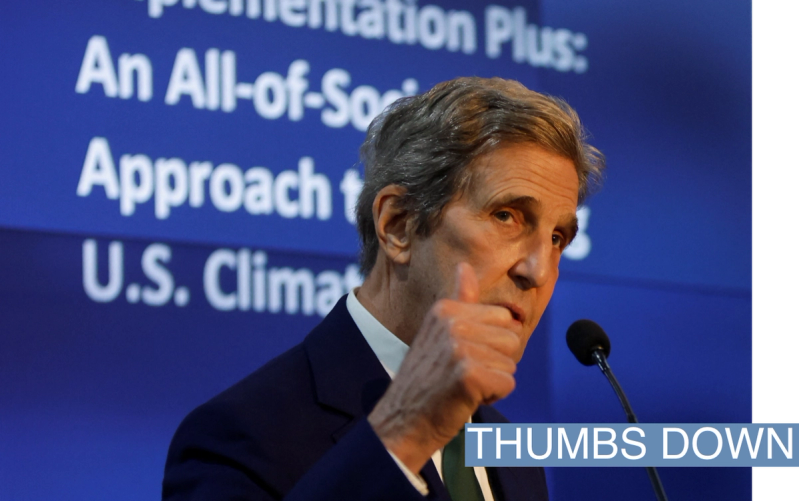The News
Sharm El-Sheikh — U.S. Climate Envoy John Kerry’s new carbon offset plan to help developing countries shift away from coal through the purchase of carbon credits was met by skepticism from climate advocates, who are worried it will encourage marketing spin in what’s known as greenwashing.
The “Energy Transition Accelerator,” launched by Kerry at the COP27 summit on Wednesday, aims to convince big companies to buy carbon credits generated by developing countries as they close down coal-fired power plants.
Flanked by climate philanthropies, corporations and civil society figures from Africa and Latin America, Kerry announced a voluntary plan to allow companies unable to immediately eliminate all their own greenhouse gas emissions to pay instead. The money would go to developing countries in exchange for the emissions cuts they achieve by closing the coal plants.
The market for carbon offsets has grown dramatically in recent years to about $2 billion. It could grow 15-fold by 2030, and perhaps 100-fold by 2050, according to the consultancy Mckinsey & Co.
But critics have long argued that the mechanism allows “greenwashing” by companies, including claims by major fossil fuel corporations that they are aiming for net zero emissions while backing new fossil fuel projects.
“There’s a real question of whether the quality of these offsets can be credibly verified,” said Amanda Starbuck, a program director at the Sunrise Movement.
Kerry alternated between soaring ambition and defensiveness in spearheading the initiative, anticipating the criticism of an effort that he acknowledged needed fleshing out and would face daunting challenges.
“We’re all here in Sharm El-Sheikh to win the battle against the climate crisis, not to give in to business as usual,” said Kerry, who is widely rumored to be attending his final global climate summit.
Bill’s view
Kerry’s announcement is one of several efforts by developed countries to steer the discussion towards the potential for private finance to supply an annual $2.5 to $3.6 trillion annually that Kerry said will be needed to help developing countries transition to clean energy.
But those needs far exceed what even the wealthiest developed countries can provide, making the involvement of private investors critical. And private funds are flowing only very haltingly.

A group of developed countries, including the U.S., is also in negotiations with Vietnam and Indonesia to arrange direct funding to close down coal plants in both Southeast Asian nations. Those talks are based on an earlier deal to provide South Africa with $8.5 billion in funding to close a major coal plant.
But that plan is proceeding slowly and has come under criticism for imposing new debts on South Africa. Vietnam and Indonesia are reportedly balking at similarly constructed schemes as hopes dim for a deal before the conference closes.
Meanwhile, Kerry has also taken up the cause of reforming giant global multilateral lending institutions such as the World Bank and International Monetary Fund. Developing countries are clamoring for the banks to loosen their lending guidelines to enable more loans at lower interest rates at a time when many developing countries are overwhelmed by existing debts.
That effort, too, is mired in the bureaucratic and political restraints of the banks. They recently announced some incremental reforms that were criticized as wholly inadequate by developing countries at the climate summit.
Room for Disagreement
Offsets were conceived as a way to focus climate spending on the quickest and most efficient ways to remove carbon from the atmosphere and head off new emissions. But the programs have also been criticized as ineffective at reducing carbon emissions while allowing companies to present themselves as addressing the problem.
The Kerry initiative is based on an earlier offsets program in which developed country governments provided funds for developing countries to sell carbon credits based on preserving forest land. In 2021, the United Nations raised $1 billion to launch the program, dubbed the LEAF Coalition (Lowering Emissions by Accelerating Forest Finance).
The program has received mixed reviews, with critics charging that it’s allowed major international companies such as Nestle, BlackRock, Delta Airlines, Walmart, and Unilever to burnish their reputation despite limited gains in forest preservation while the needs of local populations were largely ignored or harmed.
“‘Hopelessly useless’ is an accurate characterization. There’s a lot of window dressing,” said Roshan Krishnan, who researched the program for the rainforest preservation activist group Amazon Watch. He said a similar effort around coal plant decommissioning could suffer from the same sorts of problems. Krishnan noted that these sorts of coal offsets wouldn’t remove existing carbon from the atmosphere — the goal of LEAF — but simply avoid future emissions from plants, some of which are aging and likely would be closed down without the extra funds.
The View From China
China is oddly on the sidelines as COP27 attendees wrangle with the question of climate financing for developing countries.
Although China is by far the largest carbon emitter in the world now — followed by the U.S. — developing countries have directed their fire toward historic emitters in the West. For its part, China has repeated developing world complaints and touted the huge amount it has invested in developing world infrastructure, even though little of the money has been specifically earmarked for tackling climate change.
It has largely sat out of efforts to pay countries to wind down coal plants, and it hasn’t complied fully with a pledge it made at last year’s climate summit to stop funding overseas coal production.
Chinese leader Xi Jinping, who recently secured an unprecedented third term in office, is not attending COP27.
Notable
Amazon Watch’s report on the LEAF offsets program raises questions about the utility of the program.
Mia Mottley, the Prime Minister of Barbados, has been a leading voice for reform of the global finance system to address the climate needs of the developing world. Her government’s Bridgetown Agenda for the Reform of the Global Financial Architecture can be found here.
And Carbon Brief explains various ways the multilateral financial system could be reformed to target climate change in this note.

